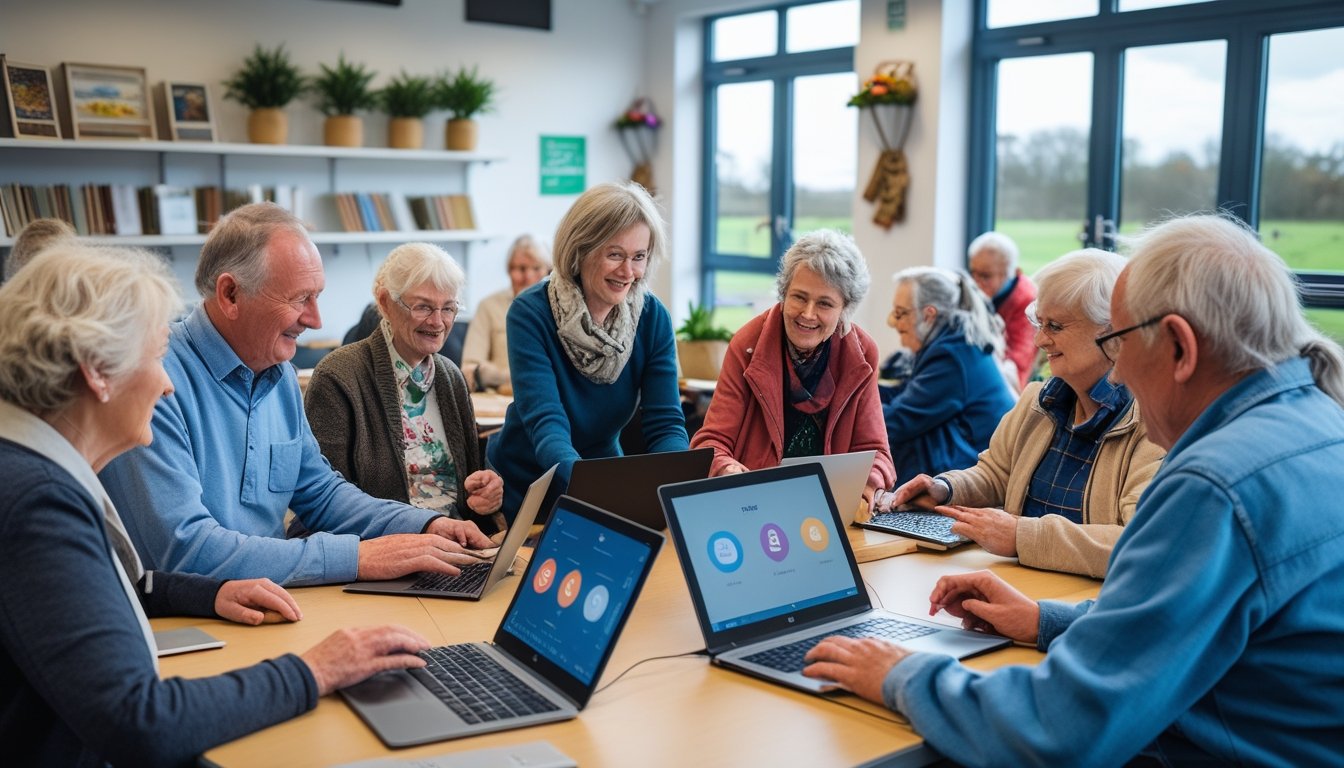Late updated: 19 Nov 2025 11:11
Written by: Oliver Bennett
Boosting Rural UK's Digital Literacy Initiatives: Advancing Technological Engagement
In today's digital age, it's easy to overlook the unique challenges faced by rural communities in the UK when it comes to access to technology and digital literacy. Enhancing digital literacy in rural areas not only bridges the divide between urban and remote communities but also unlocks new opportunities for education and economic growth. This rapidly evolving landscape requires innovative strategies and collaborative efforts from government, local organisations, and businesses to ensure no community is left behind.

Digital literacy isn't just about using computers and smartphones; it's about equipping individuals with the skills they need to navigate and thrive in a connected world. Rural areas encounter several barriers such as limited internet connectivity and fewer technological resources. Fortunately, various initiatives are underway to tackle these issues head-on.
By understanding the importance of digital literacy and implementing targeted initiatives, we can foster a more inclusive society that benefits everyone. Whether through school programmes or local community projects, these efforts aim to empower rural areas by providing essential digital skills.
Key Takeaways
- Digital literacy bridges gaps between urban and rural areas.
- Barriers in rural areas include limited connectivity and resources.
- Targeted initiatives drive inclusion and digital empowerment.
Key Challenges in Boosting Rural Digital Literacy

In rural UK, enhancing digital literacy faces unique challenges. Central issues include disparities between rural and urban regions, financial barriers, limited access to technology, and the struggle to cultivate essential digital skills among local populations.
The Digital Divide in Rural Versus Urban Areas
The digital divide is evident in the contrast between rural and urban areas. Urban settings generally benefit from better infrastructure, enabling faster internet speeds and wider access to technology. This disparity results in rural residents facing significant disadvantages regarding connectivity and technology adoption.
One reason for this gap is the lack of investment in rural infrastructure. Service providers often focus resources on urban areas, deeming them more profitable due to higher population density. Consequently, rural communities struggle with slower internet speeds and unreliable connections, limiting their access to online resources and digital opportunities.
Barriers to Digital Inclusion: Affordability and Access
Affordability and access to digital resources are significant barriers in rural communities. The high cost of digital devices, compounded by expensive internet plans, makes technology unattainable for many households. As a result, digital exclusion persists, hindering individuals from engaging in online activities essential for modern life.
Moreover, access is not just about availability; it includes digital infrastructure. Many rural areas lack the physical infrastructure for a robust digital presence. This absence extends to public facilities, such as libraries and community centres, which might not offer internet access or digital training, further isolating residents.
Digital Skills and Exclusion in Rural Communities
The digital skills gap significantly contributes to digital exclusion in rural communities. Where educational opportunities might be limited, residents often lack the necessary training to utilise digital tools effectively. This knowledge gap restricts their ability to engage with the digital world, impacting aspects such as employment, education, and social interaction.
Efforts to improve digital skills must consider localised needs. Training programmes tailored to the specific challenges faced by rural populations can bridge this gap. Collaborative efforts involving government, private sectors, and local organisations are essential to provide accessible digital literacy education and foster inclusion across rural areas.
Strategies and Initiatives for Enhancing Rural Digital Literacy

Enhancing digital literacy in rural UK requires a multifaceted approach focused on improving infrastructure, training, and connectivity. Investing in broadband, offering community-driven training, and promoting online education are key. By bridging the digital divide, we can empower rural communities with necessary skills and access to vital digital resources.
Infrastructure Investment and Broadband Services
Investments in infrastructure are essential to bolster digital connectivity in rural areas. Project Gigabit, the UK government’s initiative, is focused on ensuring high-speed broadband reaches remote locations. Enhanced broadband infrastructure not only improves broadband speed but also catalyses digital literacy.
Reliable internet services are a cornerstone for accessing educational resources and employment opportunities. The Rural Services Network underscores the importance of continued infrastructure investment. This ensures that communities are not left behind in the digital revolution.
Community-Led Digital Training Programmes
Community-led initiatives are effective in addressing specific local needs in digital literacy. These programmes are designed to provide tailored training that resonates with local cultures and lifestyles. By collaborating with local organisations and educators, we can deliver targeted content that empowers residents to utilise digital tools effectively.
These initiatives often incorporate hands-on workshops and interactive sessions. They help build confidence and skills in using new technologies, making it easier for rural populations to adapt to digital changes.
Online Education and Rural Connectivity
Rural communities benefit from improved access to online education, enabling residents to gain new skills and qualifications remotely. This is crucial for individuals in isolated areas where educational institutions may be distant or unavailable. By ensuring robust digital connectivity, we enable access to a wider range of educational resources.
Programmes that offer courses in digital technologies and internet know-how help enhance digital literacy. Access to online platforms opens doors to healthcare, financial services, and more, crucial for holistic community development.
Frequently Asked Questions
In addressing the digital divide in rural UK areas, we look at various facets, from improving internet accessibility to funding solutions for educational efforts. Local authorities and organisations also play crucial roles in these efforts, working to ensure that digital literacy becomes more widespread in the countryside.
How can internet accessibility be improved in rural regions of the UK?
Enhancing internet accessibility in rural UK areas requires investment in both infrastructure and technology. Expanding broadband networks and providing subsidies for satellite internet services can play significant roles in bridging connectivity gaps.
What strategies are in place to support digital education in rural communities?
Strategies such as community-based digital literacy programmes and mobile tech units help provide essential skills. Tailored educational content is also developed to cater to the unique needs of rural populations.
What role can local authorities play in enhancing digital literacy in the countryside?
Local authorities can support digital literacy by partnering with educational and community organisations. They can facilitate the creation of training centres and advocate for the allocation of funds towards infrastructure improvements.
Which organisations are leading initiatives to bridge the digital divide in the UK's rural areas?
Organisations like the Good Things Foundation are at the forefront, commissioning studies and implementing projects. They aim to boost digital skills and access through community-led initiatives and collaborations with local entities.
What funding options are available for digital literacy projects in rural Britain?
Funding can come from government grants, private sector partnerships, and non-profit organisations. These funds are often directed towards infrastructure development and the establishment of digital learning hubs.
How are schools in rural parts of the UK integrating digital skills into their curricula?
Rural schools are incorporating digital skills through updated curricula that include coding, digital communication, and online safety. Partnerships with tech companies provide resources and up-to-date training for both teachers and students.
